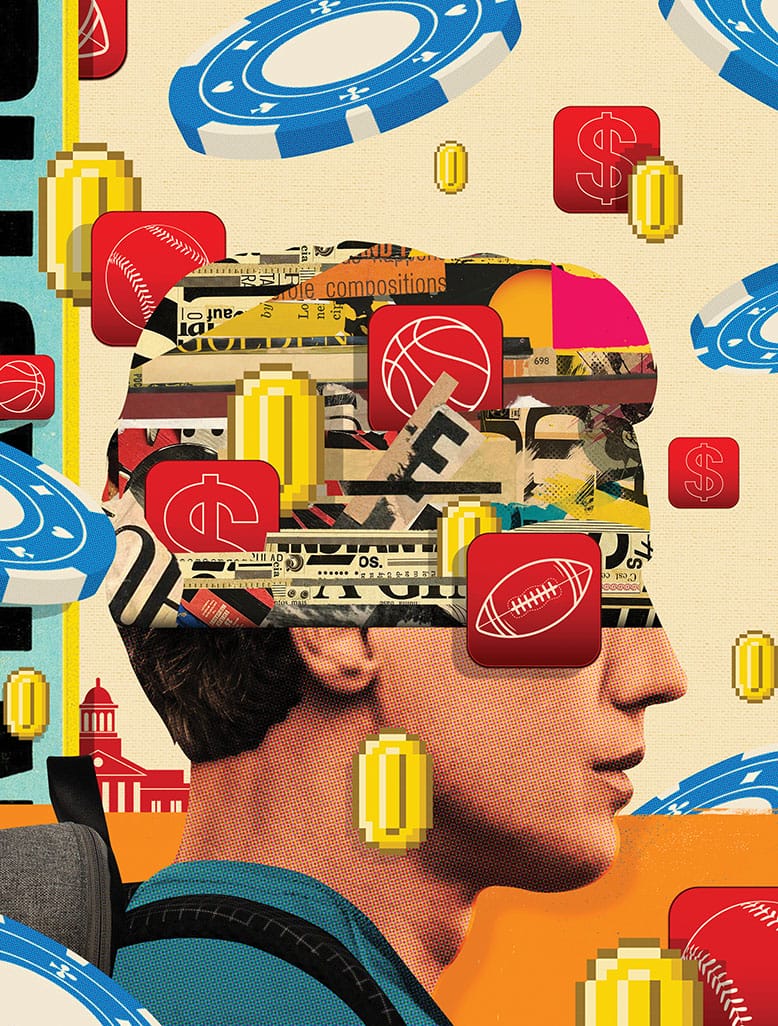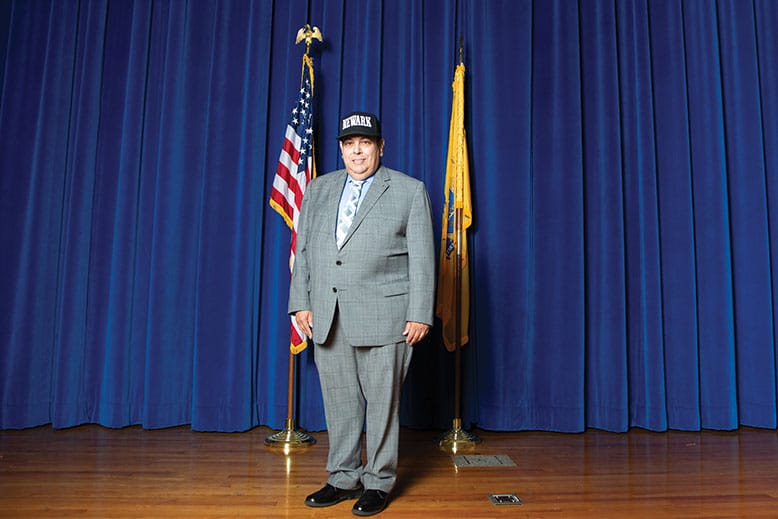

Illustration: Taylor Callery
It was a typical Sunday at Rowan University. In the dorms, in the library, and in the dining hall, clusters of students, mostly young men, were deep in study. With smartphones in hand, or hovering over their laptops, they ranged over subjects like statistics, probability, accounting and finance.
But these students weren’t cramming for finals. They were prepping for NFL game day and getting ready to place their bets.
“It’s like all around you, everywhere you go on campus, there are guys with their phones out talking about the latest line,’’ says Paige Britt, 22, a recent graduate from Rowan who says she grew to despise all the betting talk and sports-watching parties. “It was a way of life for some guys.’’
College-campus betting, and youth gambling in general, is a growing phenomena across the state. School counselors and others with insight into the issue say the trend is fueled by the spread of legal sports betting and the rise of commercial “sports books” like DraftKings and FanDuel.
For college students, many living away from home for the first time, the lure of sports-book and online betting has proven to be a pathway to addiction. Some campuses in New Jersey now offer counseling tailored to wayward young bettors. Lawmakers in Trenton have also introduced a wave of legislation to restrict sports-book advertising on college campuses.
“Ads for sports betting on a college campus are not only not necessary, they can have a huge impact on vulnerable young people,’’ says state Senator Paul D. Moriarty, a Democrat from Gloucester County who serves on the Senate Higher Education Committee. “Compulsive gambling is becoming a serious issue on campuses.’’
Many young Jerseyans who like to gamble say they do it for the fun of amicable competition with friends. Others say trolling the sports books and online gaming sites brings back happy childhood memories of watching the NFL on Sunday or college football on a crisp autumn afternoon with their families.
Evan Valentini of Lake Hopatcong, 32, says he grew up watching games with his two brothers and his dad, who would often lay down small bets through the neighborhood bookie. Later on, Valentini and his buddies took to betting on pro golf, which became a passion.
He recalls one outing with friends at Liberty National Golf Course in Jersey City, where the PGA was staging a playoff tournament.
“We were betting on everything, like first-round leader, second-round leader, even what score guys might shoot on individual golf holes,’’ he says. “Like, who would score better on the par-3s, Tony Finau or Jordan Spieth? Yeah, we bet that.’’
Today, Valentini says, he and his friends might lay out $150 on a basketball game on any given Friday night. But luckily, he says, he’s managed to steer clear of costly compulsive gambling, which he’s seen destroy others.
“It’s really out there. It’s really happening on college campuses big time,’’ he says. “When you’re that young, and you can make instant bets on your phone, it’s easy to get in over your head. All you really need is a cell phone and a credit card, basically.’’
Aidan Dougherty, a recent graduate of Rowan University who studied communications and media, hopes to be a sports broadcaster one day. He’s spending his summer traveling around the country in what he calls a play-by-play-camp, where budding announcers get experience calling real games. Dougherty says the path to compulsive gambling these days is filled with young men who love sports and socialize by watching games and making bets. He says he made his first legal bet last summer, when he lost $10 on a pro-baseball bet involving Minnesota Twins shortstop Carlos Correa. After that, he became a regular user of sports-book apps and began betting on football and basketball in addition to baseball.
One day, exulting after winning $600 on one bet, he realized how quickly the betting bug can enter the bloodstream.
“Yeah, it was easy to see how people can get into trouble, and fast,’’ he says. “In college, I saw it myself. I saw kids lose thousands (of dollars) in big bets. The whole atmosphere when you’re in school, sitting around betting with friends, is definitely dangerous; you lose control.’’
Last fall, a group of mental-health professionals met in Princeton to discuss the increasing toll that online gambling has taken on young people and their families. Everyone came with stories about how college kids and other young adults are being damaged by the explosion of interest in sports betting and legal Internet gaming.
They talked about the ubiquity of ads spreading across television and the Internet for legal sports books, like Draft Kings and FanDuel, online betting platforms that offer a galaxy of instant bets and designer parlays on everything from Major League Baseball and the NFL to niche sports like table tennis and rugby, in addition to casino-gaming options like slots, blackjack and roulette.
They also discussed how the social gatherings of college-aged men around the big game have become occasions for online betting. Casino nights and poker tournaments, they say, have become popular events on campus, often sponsored by fraternities or other campus organizations.
***
Online gambling, both legal and illegal, has exploded in popularity, and college-aged adults have grown adept at navigating offshore betting sites that are not subject to any state regulation.
The experts talk about some alarming numbers: In 2024, a Fairleigh Dickinson Poll found an increase in problem gambling in New Jersey among young men, compared with the general population. Ten percent of men aged 18-30 experienced problem gambling, compared with 3 percent of the general population, the poll found.
A higher percentage of young men bet on sports online at 26 percent compared to 10 percent of the general population.
The Council on Compulsive Gambling of New Jersey reported a nearly 300 percent increase in calls to its 800-GAMBLER helpline since New Jersey legalized sports betting in 2018. The majority of those seeking help were young people, mostly young men.
Research conducted by the council in partnership with students at the College of New Jersey found that young people are highly susceptible to social pressure from parents and older siblings for whom betting is a family tradition. More than three in four students say they were introduced to gambling between the ages of 6 and 16 through family trips to casinos, buying scratch-off lottery tickets at convenience stores, or betting with their fathers on big NFL games.
At college, the betting seed planted in the family can sprout dramatically among competitive young men who like sports and are not afraid to take risks, especially in gatherings with drinking and drug use, experts say.
“No doubt, this combination is a recipe to potentially develop a gambling problem,’’ according to the Council on Compulsive Gambling. “Research has indicated that adolescents have a significantly higher incidence of disordered gambling than adults.’’
Lia Nower is director for the Center for Gambling Studies at Rutgers University School of Social Work. Once a working attorney who served stints as both a prosecutor and a public defender, Nower left the law to become a counselor for addicted gamblers and eventually got her PhD in social work.
She has spent the last 20 years studying the dynamics of addiction and the toll gambling takes on families. Young people are the unwitting targets of sophisticated gambling marketers who hook them with smartphone apps that offer in-game betting on every aspect of a game, she says.
Sports-betting apps, she says, combine the allure of social media with the thrill of betting, allowing users to bet against their friends in real time.
“It starts with bets against your buddies—not for money, but for points, so kids are groomed into the lingo of betting and the vibe of it,’’ Nower says. “Before you know it, kids are trading their points for cash and losing real money.’’
For years, legal gaming in New Jersey was the exclusive province of Atlantic City casinos, which experts say tended to draw middle-aged and older people. Later, in a bid to attract younger customers, casinos convinced the state to allow online gaming in the form of all the traditional table games, from craps to blackjack.
But with the legalization of sports betting in 2018—New Jersey was among the first in the nation to do so—young men started gambling in droves. Nower’s research confirmed a major demographic shift to young people who followed pro and college sports or competed themselves.
“It was the perfect setup for sports-book firms,” Nower says.
“Young people are always on their phones and with their friends on social media,” she says. In college, they are away from home and the strictures of the family for the first time. They’re exposed to a flood of advertising. The result is a whole new market for internet gaming and sports betting, and a wave of college students who have suddenly become compulsive gamblers.
“It’s kind of a silent epidemic,” Nower says. “If you abuse substances, you can’t hide it forever, and sooner or later, everyone finds out. With gambling, you can hide it on your phone, in your pocket, and you can gamble away the house, the car and everything you own, and your partner and kids have no idea.’’
***
The sports-betting companies are not the only beneficiaries of the gaming boom sucking in so many young people. The state of New Jersey derives a substantial amount of revenue from legal gambling through various taxes and fees. In 2024, New Jersey’s total gambling revenue, encompassing online gambling, sports betting and land-based casinos, reached a record $6.30 billion, state records show.
In January 2024 alone, total gaming revenue reached $559.1 million—a 28 percent jump from the same month in 2023. Internet gaming grew by 19.9 percent, but the real standout was sports wagering, which surged by 136.1 percent.
While no one in Trenton is talking about killing the golden revenue goose, lawmakers are hustling to get a grip on the downside.
In July, Governor Phil Murphy approved a new law that prohibits any public college from forming a marketing partnership with sports books like DraftKings and FanDuel. The new law comes after the University of Colorado Boulder and PointsBet, an international gambling company, ended a 2023 deal that included $1.6 million to promote sports gambling on campus.
Such deals have now been condemned by industry trade groups working with lawmakers to limit sports book marketing at colleges.
“There’s a lot more we can be doing,’’ says state Senator Moriarty. “There’s a crazy amount of money being spent on sports books now. It’s bad for the integrity of the games. It’s terrible for the young people who get drawn into it.’’
Moriarty says he and his staff are working on major new legislation, to be introduced this fall, that would curtail the spread of sports-book apps and so-called microbetting, which takes place within games. Microbets are being placed on every conceivable aspect of a game, from the number of strikes and balls the starting pitcher will throw to the number of rushing first downs a football team might make in the first quarter.
“Is the next pitch going to be a fastball or a curve? You can bet on it,’’ Moriarty says. “It’s ridiculous. It preys on people, especially young ones. Lawmakers are always trying to catch up to technology. But in this case, we’re way behind.’’
Jeff Pillets is a freelance writer living in Trenton who has covered New Jersey for more than 25 years.








